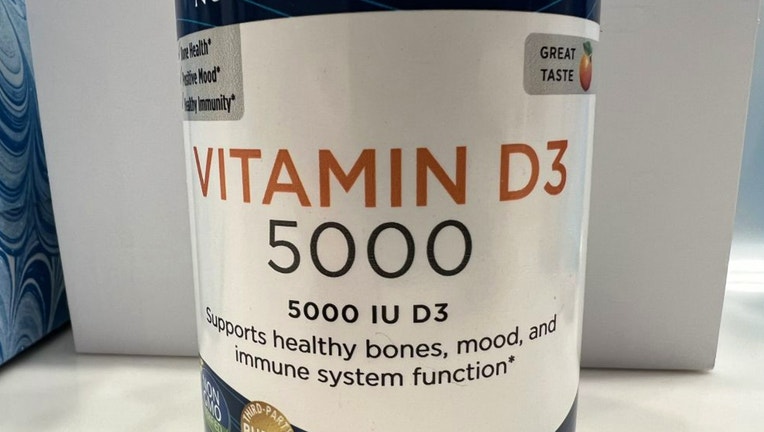Many of us have a vitamin D deficiency and don't know it, researchers say

Close-up of container of Vitamin D supplement, Lafayette, California, January 4, 2022. (Photo by Smith Collection/Gado/Getty Images)
Almost half of us, worldwide, suffer from a vitamin D deficiency. And before you go running for the sun, that may not necessarily be the cure.
The weather is warming up, the days are getting longer and even though we are spending more time outdoors, doctors still say it isn't enough. More than 42% of Americans are not getting enough of the vitamin that our skin produces from sunlight, a 2011 medical study "Prevalence of vitamin D deficiency" found.
About two-thirds of the U.S. doesn’t even get enough sun during most months to supply the necessary amount of vitamin D. North of the 37th parallel, people only get enough sun for skin to make the amount of vitamin D needed during the summer, according to a research article, "Time for more vitamin D". The line of 37 degrees latitude runs about from San Francisco east through Tulsa and Nashville to Washington.
Research papers have described this problem, known as hypovitaminosis D, as "an ignored epidemic" and a "pandemic of hypovitaminosis D."
"Vitamin D deficiency is a very serious issue for me and my patients," said FOX News medical contributor Dr. Janette Nesheiwat. "Vitamin D levels can affect so much of our body and our functioning and how we feel. It can affect our digestive system, sleep, mood, energy or vitamin and mineral levels in our bodies."
Vitamin D enables our bodies to absorb calcium which our bodies need for bone and muscle strength. More recent studies suggest a link of low vitamin levels to more than a dozen cancers, heart disease, periodontal disease, autoimmune disease, chronic skin conditions, obesity, depression and Alzheimer's disease. Severe deficits can lead to rickets in children (soft bones, bowed legs, stunted growth and bone pain) and osteoporosis (bone weakening) in adults. In contrast, adequate levels may protect our brains from toxic chemicals and reduce pain.
People with dark skin are more susceptible to lower than normal levels. Up to 82% of Blacks and 69% of Hispanics don’t have enough vitamin D, researchers found. A paper in the Journal of Human Evolution stated that dark skin needs five to six times the amount of sun a pale person needs for the same natural vitamin production.
"Many Americans are deficient in vitamin D both due to lack of sunlight and lack of proper nutrition," said Nesheiwat. "Some people are more prone to deficiency than others, for example, people that work indoors, i.e. doctors who work 14-15 hour shifts, or people who do not eat healthy."
People with Crohn’s and celiac disease, those who’ve taken long-term medicines for heartburn and reflux, are older (older skin is not as efficient at making vitamin D), have had gastric bypass surgery and/or are obese have high rates of deficiency, too.
An article published by Harvard Medical School stated that, under the right circumstances, humans need 10-15 minutes of sun every few days on their body, including arms and legs, without sunscreen to theoretically produce enough D.
More sun may not be the answer
Getting enough sun can be difficult depending on where you live, as well as dangerous. According to the Centers for Disease Control and Prevention, as little as 15 minutes of bright sun can damage unprotected skin.
Skin cancer is the most common cancer in the U.S. and about 9,500 Americans are diagnosed with skin cancer every day, according to the American Academy of Dermatology.
"If you eat a good, well-balanced diet you should have enough vitamins and minerals and not need to take supplements," said Nesheiwat.
By 1932, most producers fortified milk with vitamin D to prevent rickets. Orange juice and cereal manufacturers followed suit. Fatty fish like salmon and tuna, cod liver oil, beef liver, pork/duck fat, eel, caviar and eggs are naturally rich sources of vitamin D, but may not be a regular staple in most diets in the U.S.
Many doctors recommend supplements of 600-800 IU (international units) daily. Consult your doctor on the amount you need and the recommended type of supplement. Two studies in the Journal of the Medical Association showed that very high doses of vitamin D in older women contributed to more falls and more than 4,000 IU a day is potentially unsafe and toxic.
GET UPDATES ON THIS STORY FROM FOXWEATHER.COM

